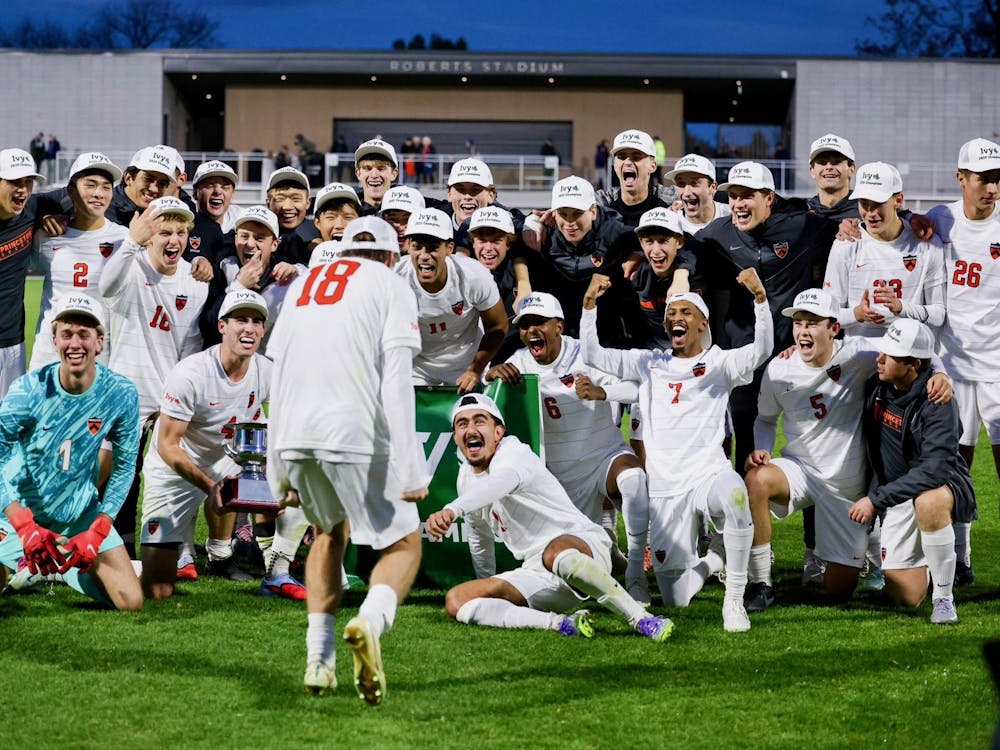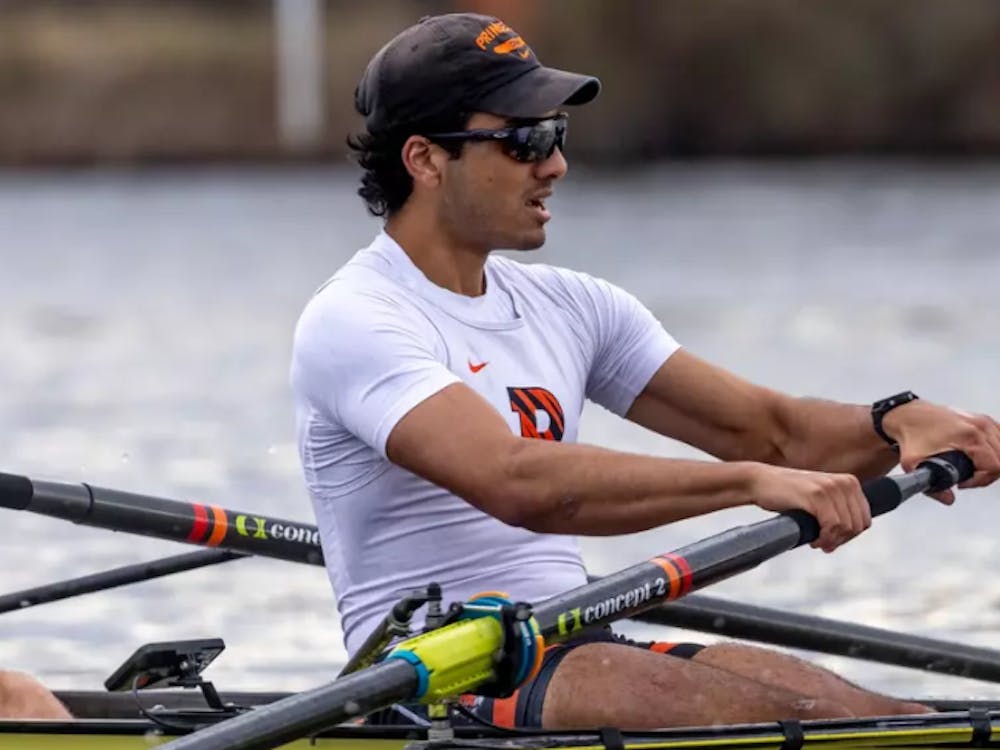The East Coast is hardly the first place you would expect to find a flourishing, storied rugby program. Rugby is mostly an international sport, more often associated with Cape Town than Princeton. And the athletes best suited to its rough-and-tumble style tend to choose football — or even hockey — while growing up in the United States.
Nonetheless, Princeton’s rugby teams don’t just endure. They flourish. Founded in 1931, the Princeton Rugby Club has played every year with the exception of the years during World War II, distinguishing it as one of the longest-tenured Princeton sports teams, club or otherwise.
Sixty years later, the women’s rugby team added to the rich history of the sport at Princeton. Founded in 1988, the women’s club became a permanent fixture in 1991 thanks to the efforts of former head coach Nancy Kechner. Under Kechner, the Tigers secured a spot in the inaugural Women’s Collegiate National Championship.
The men’s and women’s teams play both fall and spring seasons, making rugby a year-round commitment. That the obligation falls short of that for a varsity team while remaining substantive is one of the main drawing points for the ever-growing team.
“If I had to choose a target group, I’d say guys who play a sport in high school who still want the feel of a team without the commitment of a varsity sport,” junior recruitment chair Travis Pena said.
Former high school athletes who played sports like football, soccer, wrestling and track comprise much of the team. Few, however, had any exposure to rugby prior to joining the club.
“One of the great things about rugby is that it’s a sport where ‘If you have the dog in you,’ as [head] coach [Richard Lopacki] says, ‘you can just get out there and play,’ ” senior captain Benton Erwin said.
Students’ unfamiliarity with the sport is hardly a deterrent to their interest in signing up, especially with a trio of eager coaches willing to teach rugby to the newcomers.
Lopacki and assistant coaches Shane Flynn and Jim Reilly all have extensive backgrounds in rugby, having played in college or professionally. The presence of coaches increases players’ comfort level with the sport — a feature other club sports at Princeton lack.
“We have three phenomenal coaches, and that genuinely is our greatest asset as a team,” Erwin said. “They are very dedicated to the team, and they’re a huge part of our success. I couldn’t speak more highly of them.”
“Having [them] around is extremely helpful,” Pena added. “Partly because a captain has to strike a balance between being a leader and being a friend, but a coach can be hard and strict. Sometimes we need that.”
Pena’s path to the rugby team was a fairly typical one. Upon arriving at Princeton, the Dallas native knew he wanted to play a sport and be part of a team, yet he wasn’t prepared to commit on the varsity level. After an injury his freshman year, Pena was recruited by a friend to play rugby the following year.

“I had always thought that rugby would fit me well because it was a decent combination of sports I played in high school,” said Pena, who played football and wrestled before attending Princeton. “But it was really Kane [Hochster ’08] who convinced me.”
“When I did start playing, that was absolutely my first exposure … but it’s surprising how quickly you can pick it up by getting in there and playing.”
While common, Pena’s path to rugby is not the only way to become a part of the team.
On the opposite end of the spectrum is sophomore Zack Flowerman, who has been playing rugby for more than six years after picking up the sport the summer after eighth grade. Flowerman, a New Jersey native, played on an under-19 team throughout high school. He knew he wanted to continue playing in college.
“I had spoken with [Lopacki] before I got here,” Flowerman said. “And I was supposed to meet with him and the wrestling coach on the same day, but I told [Lopacki] that I’d schedule my wrestling meeting around the rugby one.”
Flowerman’s commitment level is not matched by all of his teammates, but he recognizes that the less demanding training schedule is part of the sport’s appeal.
“We’d like to see more people who have played before,” Flowerman said. “But we know the commitment wouldn’t be there for eight or nine practices a week like for a varsity sport.”
“On the other hand, we’re more dedicated and committed than the other club sports here,” he added.
Flowerman and his teammates are not alone in this opinion. Last year, the rugby squad was named Princeton’s club sports team of the year.
The team is equally active off the pitch, holding frequent socials, including some with members of opposing teams.
“Rugby is a unique sport because at every level there’s what’s called the ‘third half,’ ” Flowerman explained. “You don’t see this with any other sport, but we’ll spend time with the other team after the game … The guys you’re beating on during the games are the same ones you’re eating or drinking with after.”
The rugby team has also been remarkably active within the University community, refereeing last year’s dodgeball tournament and this year’s quidditch tournament.
The team may be best known for its “Dash to Dublin” last winter, when players raised money for their spring break trip to Ireland by taking turns riding a stationary bike outside of Frist Campus Center on December’s coldest days.
The trip itself — during which the team faced off against a handful of Irish teams — helped build the team unity that many of the players value so highly.
“It’s a very tight-knit group of guys,” Pena said. “A lot of the reason the guys stick around is because of the fraternity of the team.”
As for this season, the team’s goal remains the same as always: win the Ivy League tournament in the spring. The program, however, is also looking to the future. The University is in the process of building a $3 million rugby pitch — funded by alumni donations and scheduled to open in 2012 — next to Princeton Stadium. Pena said he hopes that the new location, closer than Princeton’s current home at the West Windsor Fields, will draw more attention to the team.
“With the new field, there should be more fans, more recruits, and the whole process should be self-perpetuating,” he said.
Even without the improved location, Erwin credits rugby with being crucial to his Princeton experience.
“It’s definitely one of the top two things I’ve done with my time here,” the senior captain said. “It’s just a great sport.”
Given Princeton’s proud tradition of excelling at athletics, perhaps it’s no surprise that even an unconventional sport like rugby has thrived in the Orange Bubble.







